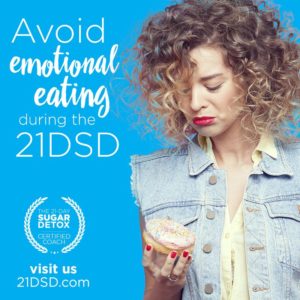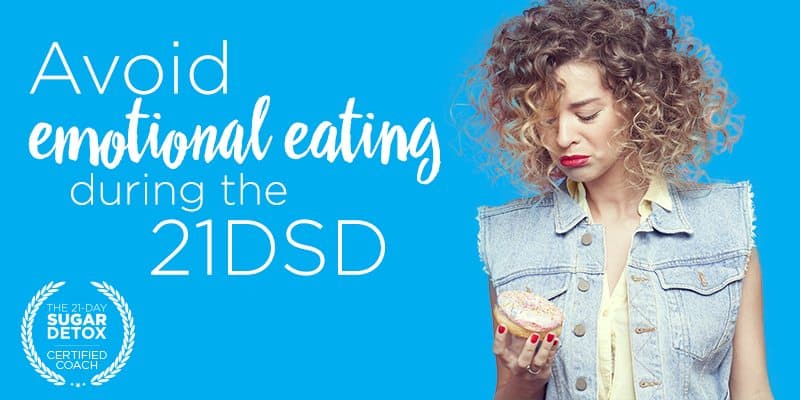Hey Folks! We're excited to welcome back Certified 21DSD Coach Michal Ofer. Michal's article is part of a series contributed by our Certified 21DSD Coaches. Enjoy! – Diane and Team
Emotionally driven eating is something most of us do, given the right circumstances. The (sometimes really huge) changes you are making to your nutrition and eating schedule when embarking on a 21DSD can be a trigger for these uncomfortable feelings. Even people who usually have few challenges when it comes to overeating often turn to food when feeling overwhelmed, overworked, or overtired. It is a complicated process. When you feel emotional, there is less resilience, less flexibility when it come to problem solving, further affecting your capacity for willpower or discipline.
If there is one common theme when deciding to taken on the challenge of a 21DSD, it has to be that the foundation for your ultimate success and gleaning the maximum benefit from the program is in your planning and preparation. This is not different when strategizing to cope with your emotional eating challenges through the 21DSD. Your plan of attack does not need to be complicated or time-consuming to get results. Do your best to make a few small adjustments during emotional or stressful times to feel more in control and much less vulnerable to mindlessly reaching for some food based comfort.
9 tiny hacks you can use to beat emotion-driven eating:
1. Breathe
Practice deep breathing. It sounds simple, but adding oxygen to your brain helps you think more clearly and make better food decisions, particularly when stress and emotions are running higher than usual.
2. Take a break
Pay extra attention to transition times between activities (which can tend to disappear or even overlap when stress comes into play). People often stress eat at a transition or use food as a way to numb out, revive themselves, or procrastinate. Instead, give yourself a short break, even just a few moments, to pause, breathe, make a cup of tea, or close your eyes and clear your mind before diving in to the next activity.
 3. Eat regularly
3. Eat regularly
A great 21DSD strategy to deal with both cravings and emotional eating is not letting yourself get too hungry. This is the time when you are more apt to lose control and make choices you regret. Set a reminder if you need to, but eat at regular intervals. Invest the time to make a plan for what you’ll eat ahead of time. It will be worth it.
4. Minimize mindless eating
Set a no multi-tasking rule while you eat. Especially during stressful times and the challenge of busy, modern lives, you may feel time-crunched, but try this. It helps.
5. Strategize
Create a plan and a ritual to avoid night eating. Try focusing on doing some relaxing activities you enjoy without including food.
6. Enlist help
Make a second column in your to-do list. Call it “Who can help me with this.” Do your best to avoid falling into the trap of feeling too busy to take the time to ask for help. The result will be you feeling even more overwhelmed and, quite likely, craving sugars and refined carbohydrates.
7. Connect
Find ways to connect with yourself and to stay aware of your feelings, your hunger, and your needs. Set a reminder on your phone to check in with yourself. This will give you the time and space to be more able to give yourself what you really need instead of letting hidden hungers (like exhaustion or emotions) trigger a reactionary choice you may regret.
8. Take 5
Leverage the value of five minutes. A quick walk, a change of scenery, some easy stretches, or watching a funny video online can help you recalibrate and avoid emotionally driven food choices when you fid yourself feeling overwhelmed.
9. Progress, not perfection
Ignore your perfectionist. When things fail to go as planned (or go totally off the rails) look for the opportunity. What is the learning that you can use to tweak and adjust your strategies as you move forward? How can you use this situation as something happening FOR you, rather than TO you?
During your 21DSD and beyond, you will find yourself making better and healthier food choices if you do not allow your emotions guide your menu choices. When you do choose to eat, pay attention to what you are putting on your fork on and savor every bite.

Michal Ofer is a certified life coach, health coach and 21DSD coach.
She has always had a love for food, cooking and all things nutrition related. Michal grew up in South Africa where she studied biological sciences and got her degree in Optometry with a minor in holistic nutrition. After some travelling, disguised as learning overseas, Michal immigrated to Canada where she worked in business development and team building. A less than positive experience with the current acute care medical system and “Standard American (Canadian) Diet” whilst trying to overcome a chronic health issue led Michal on a path to discovering that food truly is our best medicine and that all healing begins in the gut. Once recovered, Michal wanted to help others reach their optimal level of health, wellness and vitality that a real food approach to diet gives. Michal is a nutritional consultant working with individuals looking to improve their general well-being, with a special emphasis on naturally and holistically healing the damage that disordered eating creates in the entire digestive system. When not counselling others or trying to keep up to date with the online world, Michal is an amateur cook, testing her newest food creations on brave volunteers. She can be reached at [email protected] for further insight into moving beyond eating disorders.


Comments 1
Pingback: Sauteed Sweet Plantains | What's Up Weekly with Diane | July 19th, 2017